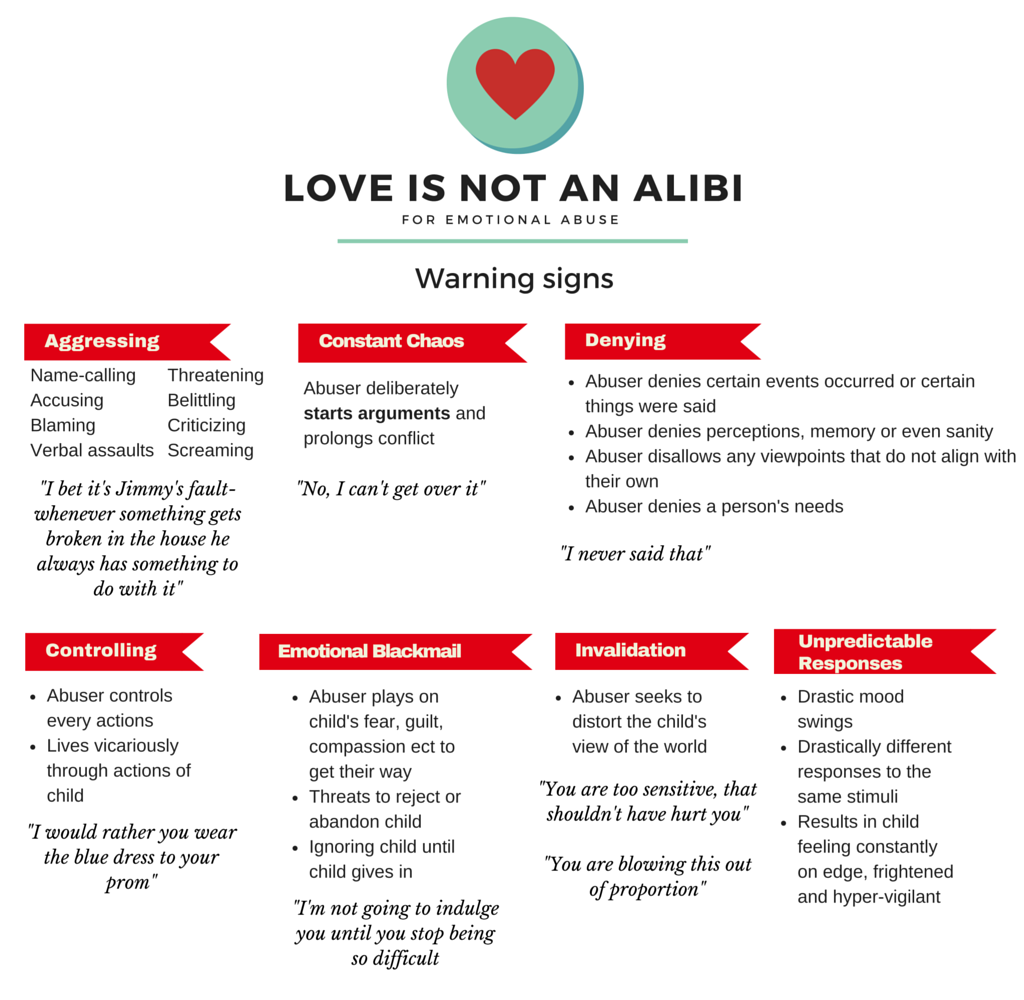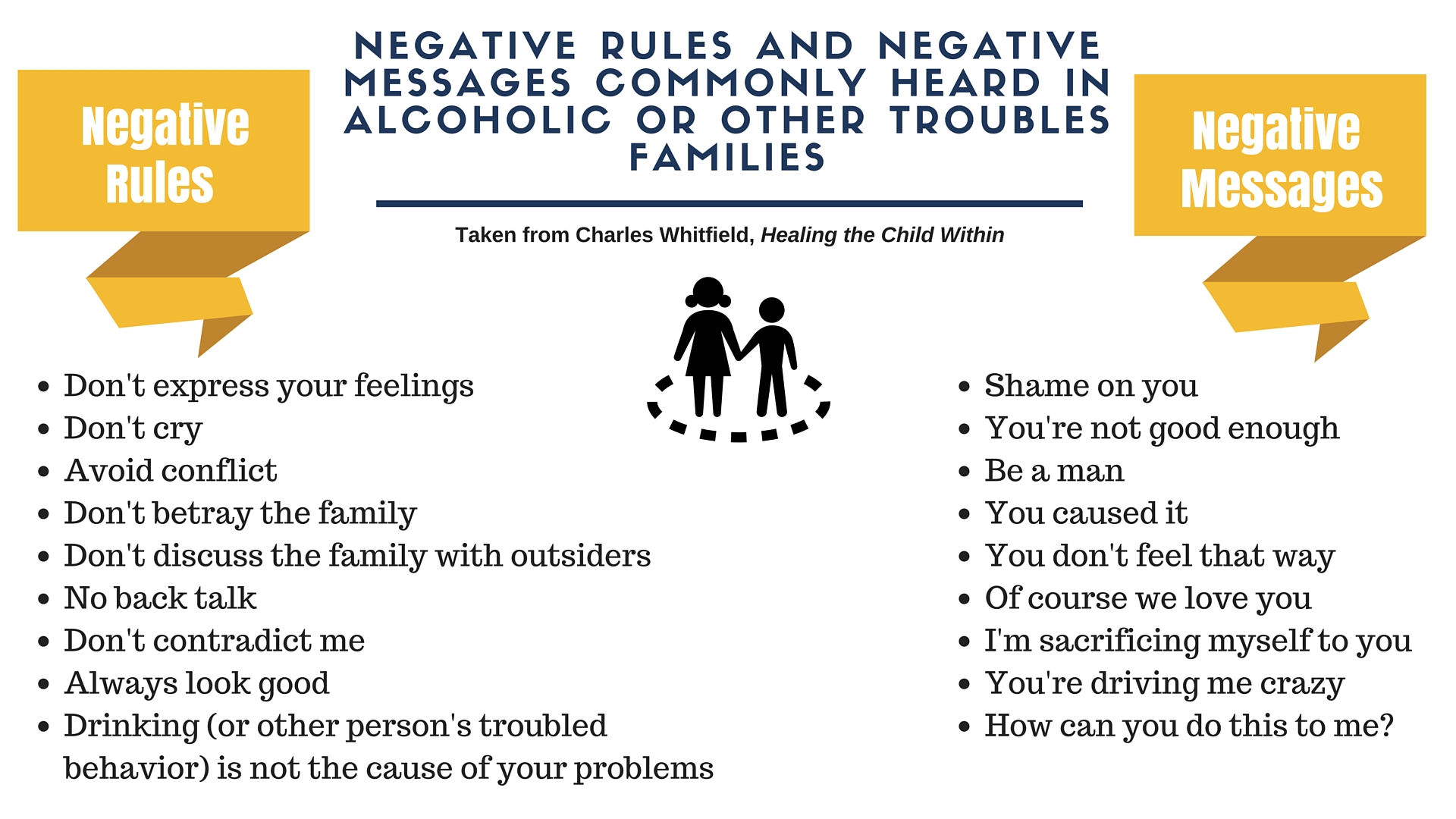EMOTIONAL ABUSE & DYSFUNCTIONAL FAMILIES
What is abuse?
"Abuse is any behavior that is designed to control and subjugate another human being through the use of fear, humiliation, intimidation, guilt, coercion, manipulation etc. Emotional abuse is any kind of abuse that is emotional rather than physical in nature. It can include anything from verbal abuse and constant criticism to more subtle tactics, such as repeated disapproval or even the refusal to ever be pleased."
Self-described Characteristics of Emotionally Abused People
- We perpetuate these parental messages by judging ourselves and others harshly. We try to cover up our poor opinions of ourselves by being perfectionistic, controlling, contemptuous and gossipy
- We are desperate for love and approval and will do anything to make people like us. Not wanting to hurt others, we remain "loyal" in situations and relationships even when evidence indicates our loyalty is undeserved
- We are intimidated by angry people and personal criticism. This causes us to feel inadequate and insecure
- Often take responsibility for problems, but not successes
- We feel guilty when we stand up for ourselves or act in our own best interests. We give in to others' needs and opinions instead of taking care of ourselves
- We are dependent personalities who are so terrified of rejection or abandonment that we tend to stay in situations or relationships that are harmful to us.
- Expect others to just “know what we want” (We can’t express it because we were so often disappointed as children that we learned to stop asking for things)
Basic needs in relationships
Patricia Evans (1992) and Steven Hein
- The need for good will from the others.
- The need for emotional support.
- The need to be heard by the other and to be responded to with respect and acceptance
- The need to have your own view, even if others have a different view.
- The need to have your feelings and experience acknowledged as real.
- The need to receive a sincere apology for any jokes or actions you find offensive.
- The need for clear, honest and informative answers to questions about what affects you.
- The need to for freedom from accusation, interrogation and blame.
- The need to live free from criticism and judgment.
- The need to have your work and your interests respected.
- The need for encouragement.
- The need for freedom from emotional and physical threat.
- The need for freedom from from angry outburst and rage.
- The need for freedom from labels which devalue you.
- The need to be respectfully asked rather than ordered.
- The need to have your final decisions accepted.
- The need for privacy at times.
Possible negative consequences of a dysfunctional family that manifest in future relationships
- Try to become a care-giver as a way to get your needs met
- Attracted to emotionally unavailable partners whom you can try to “change” through your love, because you were never able to change your parents into warm, loving caretakers
- When terrified of abandonment, do anything to keep a relationship from dissolving
- Nothing is too much trouble, too time-consuming, or too expensive if it will “help” the person with whom you are involved
- Willing to take far more than 50% of the responsibility, guilt and blame in any relationship
- You believe you must “earn” the right to enjoy life
- You are more in touch with your dream of how your relationship could be than with the reality of the situation
The Fatal Flaw
The fatal flaw is the belief that there is inherently something “bad” or “wrong” with you, and that if others get “close enough”, they will discover the fatal flaw that will force them to abandon and/or be disgusted by you. Individuals believing they possess a fatal flaw try to push others away in the hopes of “concealing” this flaw, or maintain negative behaviors in relationships in order to prove to themselves that they are indeed “bad”.
The fatal flaw doesn’t really exist. It’s not a real thing. But it is a real feeling.
Affirmations for the Initiative
Taken from John Bradshaw: "Healing the Child Within"
- It’s okay for you to have your own view of the world, to be who you are and to test your power
- It’s okay to imagine things without being afraid they will come true
- You don’t have to act scared, sick or mad in order to get your needs met
- You can be powerful and still have needs
- It’s okay to find out the consequences of your behavior
- It’s okay to be curious about sex and gender differences
- It’s okay to be a boy or girl
- It’s important to find out what you’re about
- It’s okay to feel what you feel

